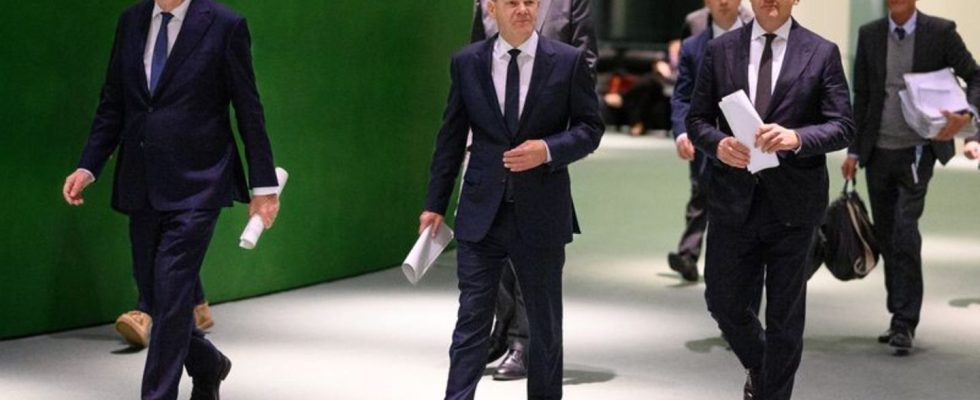migration
Prime Ministers discuss asylum policy with Scholz
Olaf Scholz (M, SPD), Boris Rhein (r, CDU) and Stephan Weil (l, SPD) after the federal-state summit last November – now they are coming together again. photo
© Bernd von Jutrczenka/dpa
In November, after a tough struggle, the federal and state governments agreed on a migration compromise. Now the focus is on implementation – and the results are very different.
The heads of government of the federal states want to talk to Chancellor Olaf Scholz (SPD) today about where they still see a need for action in asylum policy. Union politicians once again insisted on more decisive and quicker measures to limit irregularities Migration. Municipalities warned that they were at their limits when it came to accommodating asylum seekers.
“Another year like this on top, with even more people on top, will push us to the limits of what is still possible,” said North Rhine-Westphalia’s Prime Minister Hendrik Wüst on the ARD program “Maischberger”. The pressure remains “incredibly great,” he said in the ZDF “Morgenmagazin”. “This is global migration pressure and we cannot manage it here.”
Wüst criticizes the lack of implementation of agreed measures
Wüst criticized that the majority of the agreements made at the last federal-state meeting in November were not implemented or were not implemented with proper effect. He mentioned, for example, migration and repatriation agreements. The federal law for improved returns is “pretty much cosmetic.” The Prime Minister of Rhineland-Palatinate, Malu Dreyer (SPD), told the newspapers of the Funke media group that a lot had already been implemented. “The number of refugees is falling, this is certainly also due to the winter effect, but it also shows that the measures are working.”
In Germany, around 329,000 people made an initial application for asylum last year – around 50 percent more than in 2022. The more than one million refugees from Ukraine who came to Germany since the start of the war at the end of February 2022 are not included in this because they do not have asylum must apply.
Bavaria’s Interior Minister Joachim Herrmann (CSU) told the editorial network Germany (RND): “Above all, I expect the Prime Minister’s Conference to state unambiguously that we are limiting immigration.” He repeated the Bavarian demand for an “integration limit”: “It makes it clear up to what number of refugees integration is affordable.”
Warning of “outbidding competition”
Thuringia’s Prime Minister Bodo Ramelow warned in the “Rheinische Post” of a “competition to outdo the most blatant formulations” in asylum policy. And according to a spokesman, Baden-Württemberg’s Prime Minister Winfried Kretschmann (Greens) is fundamentally skeptical about continually putting forward new demands. “The Prime Minister’s Conference already made far-reaching decisions at the end of last year,” the spokesman told the RND. “The first thing now is to ensure that what has been decided is fully implemented and to see whether we need to make adjustments in some areas.”
The German Association of Cities and Municipalities once again called for relief for municipalities. “The municipalities are at their limits when it comes to accommodation, care and integration,” said managing director André Berghegger to the “Augsburger Allgemeine”. The federal and state governments would have to contribute more to the costs of accommodation and integration as well as the creation of additional necessary daycare places.
Possible points of contention have been cleared up in advance
At the last federal and state refugee summit in November, the prime ministers wrested a per capita flat rate from the federal government as an additional contribution to the asylum costs: 7,500 euros per year for everyone who applies for asylum in Germany for the first time. “We have taken a really good path,” said the chairman of the Prime Minister’s Conference, Hesse’s Prime Minister Boris Rhein (CDU), to the dpa. In addition, measures to reduce irregular migration to Germany were agreed at that time.
Before the current meeting, some possible points of contention had already been cleared up: A few days ago, the traffic light coalition gave in to the states’ pressure for a federal regulation on payment cards for asylum seekers. To ensure that asylum procedures are processed more quickly, Federal Interior Minister Nancy Faeser (SPD) has just announced more staff for the Federal Office for Migration and Refugees.
Rhine: Asylum procedures outside the EU are an important issue
Prime Minister Rhein sees an important issue in the question of whether asylum procedures would be possible outside the EU. From the perspective of the countries, asylum procedures in so-called third countries could be an important and helpful instrument for reducing the number of refugees. According to the federal government, the agreed review has not yet been completed.
The country leaders also want to discuss economic policy decisions at their meeting. But the Chancellor won’t be there. Specifically, it is probably about the Growth Opportunities Act, which is still blocked in the Federal Council, measures against high energy prices, the acceleration of planning and approval processes and the question of whether insurance against natural hazards should become mandatory.

